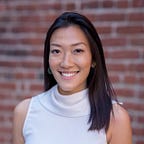Practicum Pride: MSDS Students Present at “Data Science, Beer and Sports”
To kick off SF Beer Week 2020, USF’s Data Institute partnered with Standard Deviant Brewing to host the first “Data Science, Beer and Sports” event. The speakers were our very own MS in Data Science students who presented the projects they are tackling at their practicums with the New York Mets, Golden State Warriors and the Baltimore Orioles. Continue reading to learn more about the projects they presented, and their practicum experience working for a professional sports team!
On a warm Tuesday evening, Standard Deviant Brewing in San Francisco’s Mission neighborhood was packed with MSDS students, faculty, alumni and members of the public, both aware and unaware of what they just walked into. It was an unusual sight — TV-screens that usually broadcasted live games depicted the sport through graphs and charts instead. Four MSDS students presented and took questions from a mixed crowd of data scientists and sports enthusiasts. We caught up with the students after the event to tell us more about their projects.
Rushil Sheth (New York Mets): “Positionless Baseball”
Rushil joined the MSDS program after working as a Business Analyst at Pinterest. He has a BS in Applied Mathematics and Statistics from UC Berkeley.
What was your presentation about?
I am working with the New York Mets on their infield defensive model. One of the most important aspects of the model is ranking and rating infield players. While I was developing this using machine learning, the MLB released a brand new metric that did just this. Outs above average, the MLB’s new metric, had much more granularity and overall maturity than my model and made it easy to adopt and gave rise to my presentation on positionless baseball.
How have you applied knowledge gained from the program to your practicum?
During class I constantly find myself absorbing a concept and many times seeing ways to translate this to my project with the Mets. This also makes it much easier to understand new concepts. Most recently, I used the Kolmogorov-Smirnov test to test how certain predictors for binary classification varied when I removed a particular predictor from my Random Forest.
Shirley Li & Kyrill Rekun (Golden State Warriors): “Data Science Meets Marketing Analytics”
Shirley joined the MSDS program after obtaining a Master of Professional Accounting from UC Irvine. Kyrill joined after working as a Data Analyst at PaxVax. He has a BS in Statistics from San Francisco State University.
What was your presentation about?
Our presentation mainly talked about our experience and projects at GSW. We first introduced our primary datasets and elaborated on some of the data challenges we met, including SQL’s efficiency as well as the usage of historical data when facing big changes. We presented a few of our projects, including a tableau dashboard that provides demographic analysis, and a machine learning model that classifies last-minute ticket buyers. We closed by talking about the different perspectives between marketing analytics and data science, and incoming projects at GSW we are excited to work on.
How have you applied knowledge gained from the program to your practicum?
We feel that we have applied knowledge and skills from almost every class at our practicum. Working at GSW has allowed us to become proficient in combining multiple techniques to produce an outcome. We started off with SQL, pandas, and looking at distributions just like we did in bootcamp. Then we moved on to data visualizations and communication. Finally, we started building many of the models we learned so far such as logistic regression, KNN, Random Forest, and Gradient Boosting. Every week as we learn new things we are eager to apply it at GSW. For example, making a recommender system for matching games with customers or seeing if a neural net would beat our GBT model for last-minute sales.
Collin Prather (Baltimore Orioles): “MoneyBall is Dead: Why Player Development is the Final Frontier for Baseball Analytics”
Collin came to the MSDS program with a BS in Mathematics from Cornerstone University.
What was your presentation about?
For the MSDS Beer Week event, I gave a talk titled, “MoneyBall is Dead: Why Player Development is the Final Frontier for Baseball Analytics”. This included a high-level overview of what data analysis in MLB organizations has looked like since the turn of the century and why the adoption of new high-frequency data collection devices, like high-speed cameras and radar, is changing how the game of baseball is played. In particular, when leveraging modern data-analytical techniques into a consistent training regimen, we can optimize players the same way that we would optimize an ad-targeting campaign. Over the past 3 years, this process has turned average players into elite players over the course of a single off-season!
How have you applied knowledge gained from the program to your practicum?
During my practicum with the Baltimore Orioles, I’ve been challenged to think deeply how we as analysts can use the volumes of newly available data to improve decision-making from all departments within the organization. An important piece of ensuring those analytical insights gets distributed across the organization is communicating effectively. In order to give the Orioles front office on-demand access to my analysis and the outputs of my model, I used techniques from our data-acquisition course to design and deploy a web app which hosted my model and some explanatory visualizations.
Find out more about USF’s MS in Data Science program and their Practicum Program.
